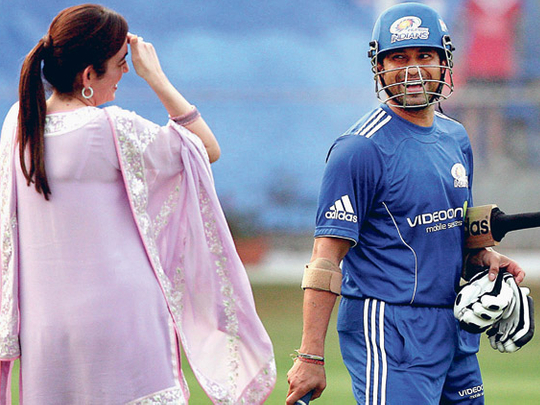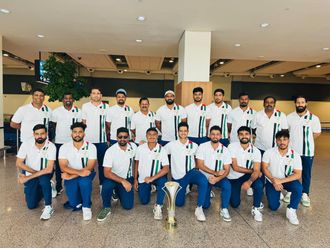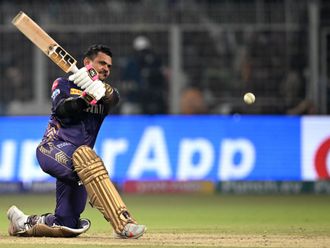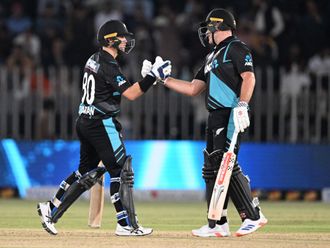
Dubai: Mumbai for the Maharashtrians. I kept repeating this insular ideology — adopted by the Maharashtra Navnirman Sena (MNS) and the Shiv Sena — while counting heads in the Mumbai Indians team currently perched on top of the food chain in the Indian Premier League (IPL).
And here are the results: in an overall squad of 40 players the Mumbai Indians (whoever came up with this name should get an award for national integration) have just seven Maharashtrians and nine overseas professionals. This means that 24 players represent the rest of India.
According to me, this is a blow in the face for those misguided, shortsighted, idiotic politicians and their goons who wander about the streets of Mumbai beating up and harassing anyone who dares to drive a taxi, or cannot speak Marathi, or both.
Even politicians prefer not to mess around with this outfit given that it is propped up by the sheer financial might of behemoths, Reliance Industries Limited.
The Mumbai Indians franchise is owned by IndiaWin (note again the play on the word ‘India') an offshoot of Reliance Industries.
Somehow all political dogma wavers at the sheer economic intellect of Mukesh Ambani, whose company's annual revenues exceed $34billion (Dh124.8 billion), making it India's largest private sector organisation and an elite member of the Fortune 500 Group.
Fully-involved owners
For those who are sycophants and for those who are not, the boss is referred to as Mukesh bhai (brother) and his wife as Nita bhabhi (sister-in-law). It is a soft reference, but the tone is always reverential. Even if Sachin Tendulkar, a cricketer who is more visible than Mukesh Ambani, makes the address.
When the Mumbai Indians go out to earn their IPL stripes, Mukesh and Nita put their game face on.
The responsibilities are clearly defined: Mukesh networks in the stands, while his wife perches herself firmly in the dugouts with the team. She is the Indians' ‘go to' person: the eyes, ears and conscience of the team. The term ‘bhabhi' gathers meaning as she mingles among the players like an elder sister.
The Indians have been progressing with every game, much like the steady, measured, approach of its owners who, despite the huge financial muscle at their disposal, haven't flashed all their cash… yet.
The method is to make viable, modest acquisitions — from bits and pieces, but honest cricketers from Karnakata, Bihar, Punjab, Jharkhand and even Assam — who present optimum results. It is a business model which is working.
On cricketing matters, the counsel comes from Sachin Tendulkar, an Indian first and then a Maharashtrian — as Bal Thackeray has now realised much to his chagrin.
Tendulkar is leading this outfit from the front, setting the kind of example that is expected from a player and captain of his stature. However, off the field, the Indians have been snaring away quality talent from the rest of the franchises.
The twin signings of TA Sekar and Robin Singh is an example of this foresight.
Sekar has been appointed director of cricket, while Singh is the head coach. Tendulkar and his bhaiyya and bhabhi clearly have an appreciation for home grown talent.
Sadly, the Board of Control for Cricket in India (BCCI), the guardians of the game in the country have failed in this aspect.
The BCCI's financial might is tarred with arrogance. Apart from making huge sums of money for themselves and the cricketers (most of whom have gone on to become arrogant like their masters) they have done little else for cricket in India.
The flaunt this cash by hiring everything foreign — from bowling coaches, to masseurs and support staff who add to the BCCI's shallow interpretation of their own self-worth.
The Mumbai Indians have, quite rightly, subscribed to the view that real talent lies at home.
Few followers of Indian cricket have managed to comprehend the importance of T.A. Sekar as a bowling coach.
In the international arena he strides amongst fast bowlers and others of his ilk like a colossus. Except that he walks softly.
The bowling nets and pitches on the premises of the MRF Pace Academy in Chennai bear a mute testimony to his skills.
Priceless inputs
But if one goes to cricketers for evidence of his priceless inputs then the likes of Zaheer Khan, Brett Lee, Mashrafe Mortaza, Chaminda Vaas, Harbhajan Singh, Makhaya Ntini, Mohammad Asif, Ryan Sidebottom and S. Sreesanth, to name but a few, will suffice.
When Sekar asks his wards to ‘load up' they know what is expected from them as they begin to comprehend the nuances of their craft.
As for Robin Singh, few have criticised his work ethic and commitment when he wore India colours — both as a player and the national team's fielding coach.
When Singh and Venkatesh Prasad, India's bowling coach, were sacked unceremoniously by the BCCI after the country's disastrous outing in the Champions Trophy, Tendulkar's praise for their contributions was far from not muted.
It was subtle, but effective. He saw in them what the presiding deities of Indian cricket failed to see: commitment.
Tendulkar knows the value of that phrase. It has been the cornerstone of his devotion to the game.
He has taken from it but given back in equal measure. The diversity and success of the Mumbai Indians is testimony to this.
The same sense of faithfulness towards the common Indian has been sowed and harvested with tremendous dividends by the Ambanis.
They have grown from modest beginnings to become one of the country's main pillars of economic reliance (pardon the pun).












